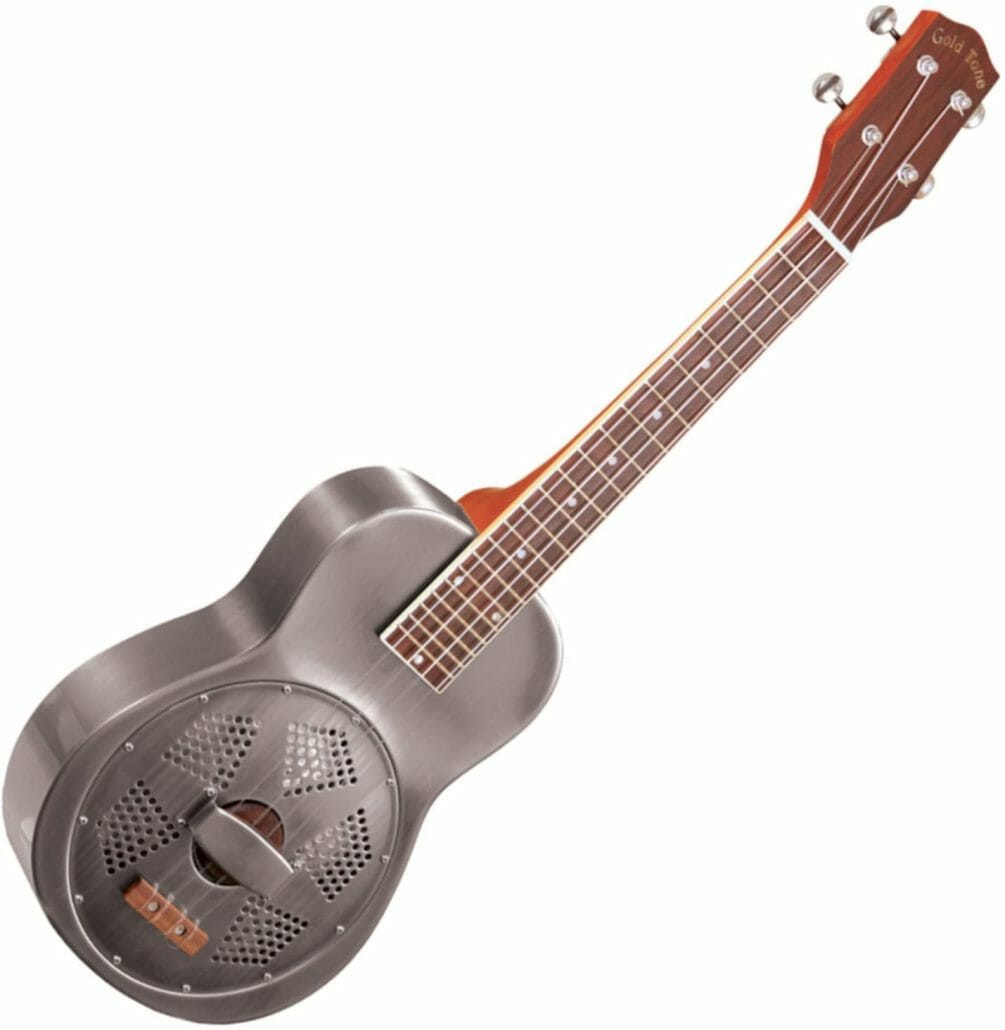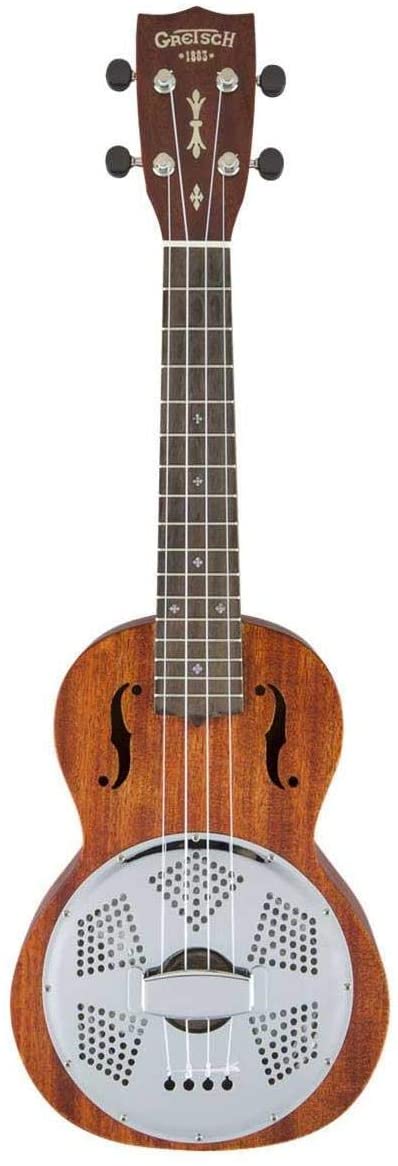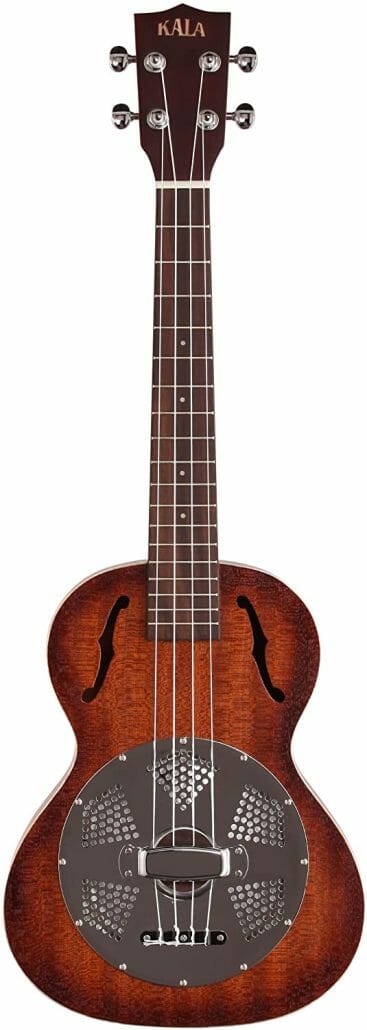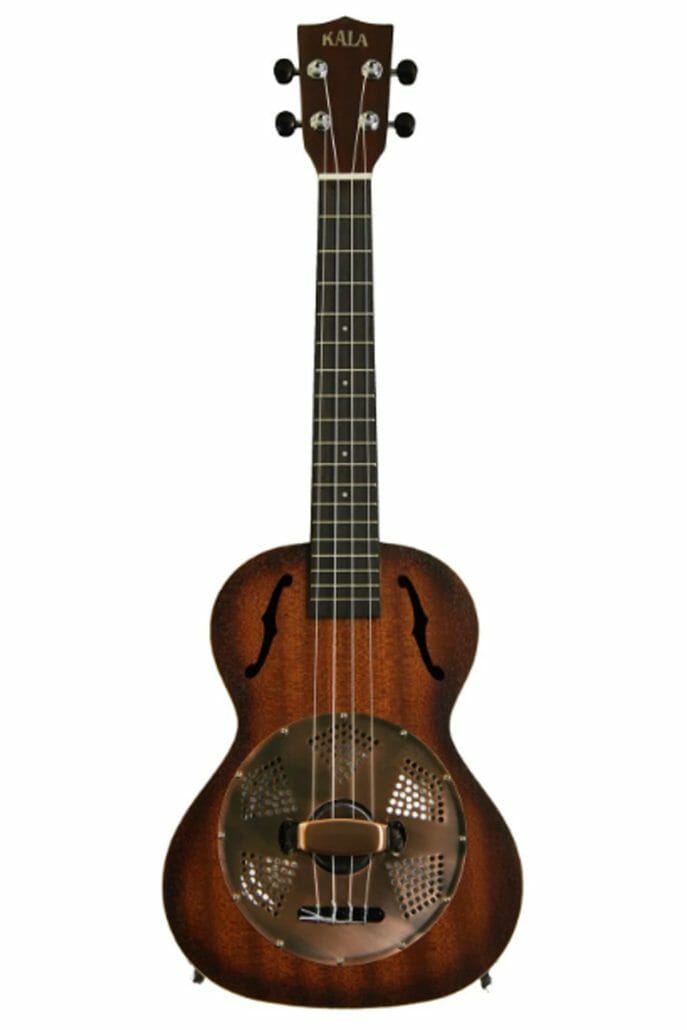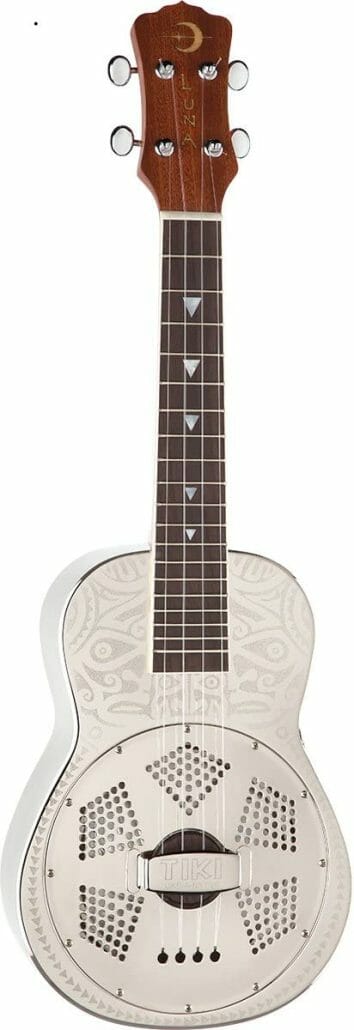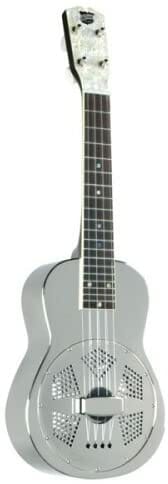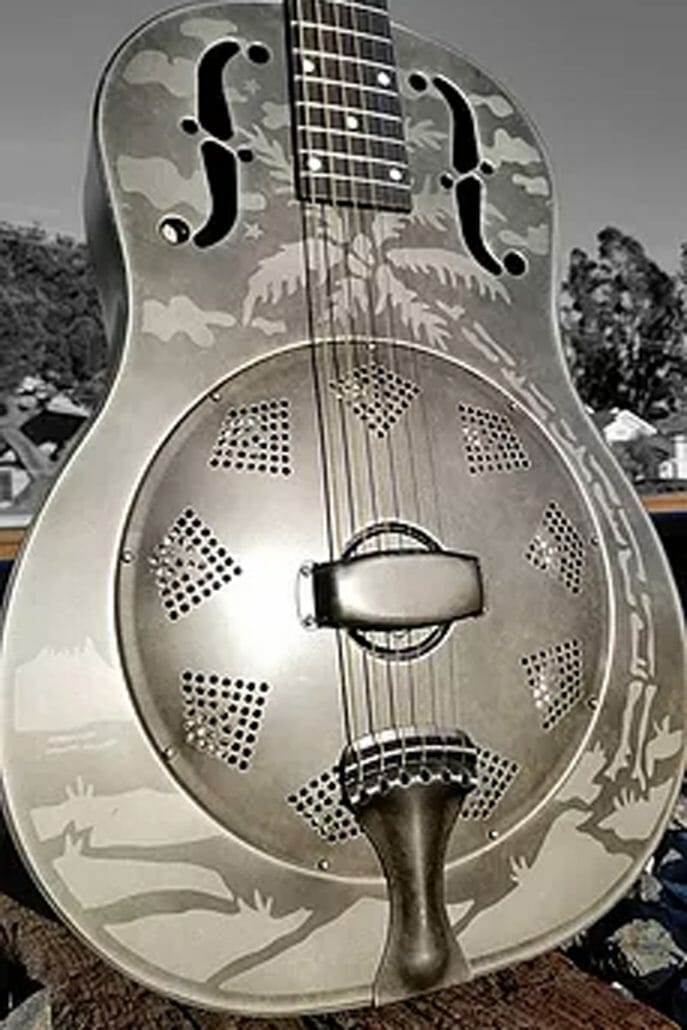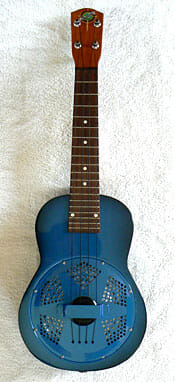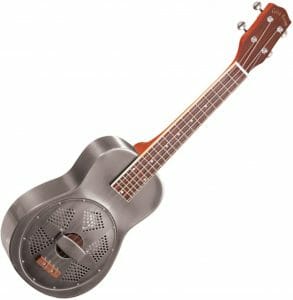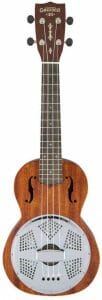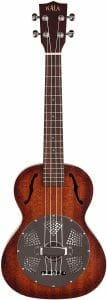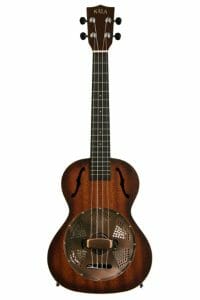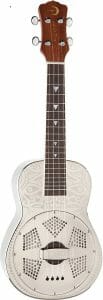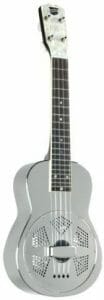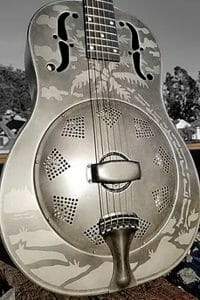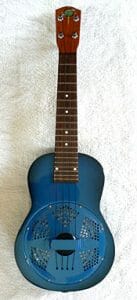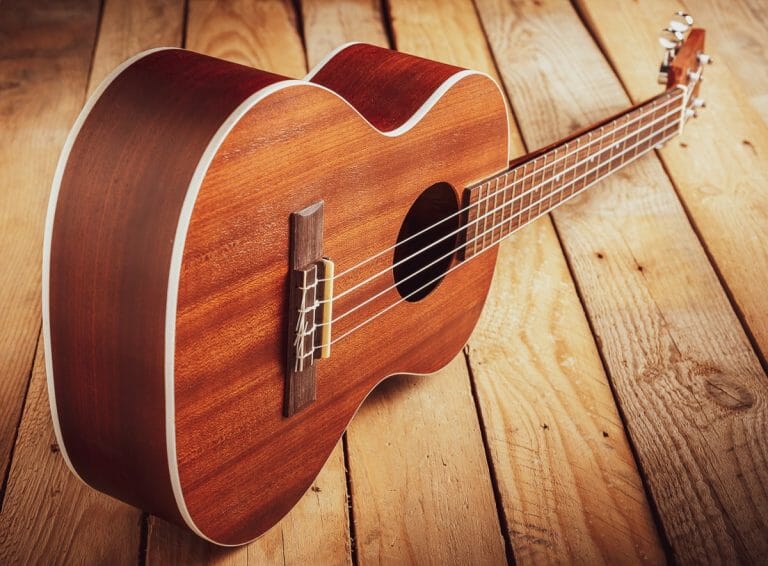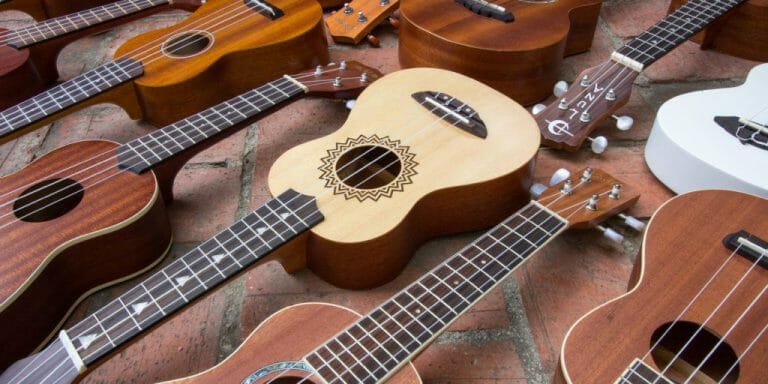The Ultimate List of Resonator Ukuleles 2026
Looking for resonator ukuleles are a challenging feat, especially since they’re quite a rare find and their peculiar tone only works for specific genres. It’s a niche within a niche, but nonetheless it’s an instrument that’s as interesting as it is important. The hardest part about getting yourself a resonator ukulele is finding where to buy one, but we already got you covered on that. Now what’s left for us to do is figure out the right resonator ukulele for you – and we’re actually here to show you an array of choices you can sink your teeth on. These biscuit resonator cone, 4-stringed power is an easy show-stopper and stunner in any bluegrass, folk, or rock gig. So, let’s get onto the list and pick out the right resonator ukulele for you!
Top 8 Resonator Ukuleles 2021
1. Gold Tone, 4-String Ukulele (RESOUKE-T) – The Perfectly Balanced Choice
- Size: Tenor
- Material: steel body with brushed aluminum finish
- Thickness: 3 inches
- Weight: 3.89 pounds
- Outstanding feature: reverse-cone resonator and biscuit bridge
The Gold Tone is at the top of the list for one specific reason: it’s not shy about delivering the best possible value for money with regards to resonator ukuleles. The Gold Tone Tenor Resonator Ukulele boasts a reverse-cone resonator and a biscuit bridge that’s intelligently paired to its resonant steel body. The guitar offers top of the line sound projection along with very punchy and attack-filled tones. It’s palm rest is also removable for ease of use, while it’s also decked with a Canadian hard rock maple saddle, a bone nut, Kluson-style tuning machine heads, Aquila Nylgut strings that are custom to the guitar, and a hard shell case for easier bringing around.
- Great sound projection
- Amazing aesthetic
- Awesome mahogany neck
- Hard case included
- One may appreciate the warmth of the wood more than this
- This one’s a definite giveaway – RUST
2. Gretsch G9112 Resonator Ukulele Natural – The Standard Choice
- Size: Concert
- Material: laminated mahogany
- Thickness: 5 inches
- Weight: 0.0022 pounds
- Outstanding feature: It boasts a 6-inch biscuit resonator cone that gives it a distinct tone and volume
This one of a kind, tour de force of a ukulele is clad with amazing peripherals – from the laminated mahogany, the rosewood saddle and neck, Grover tuning pegs, and the Aquila Nylgut strings. But what really makes this Gretsch beauty stand out is the 6 inch resonator biscuit cone that provides great tones and sound projection that works well with its f-holes. As they are masters of the craft in making hollow bodied electric guitars, Gretsch proves yet again they can take on the peculiar in the best way possible.
- Loud 6-inch biscuit resonator cone that pair well with the f-holes
- Amazing laminated Mahogany body
- You just can’t go wrong with Gretsch
- Not everyone may like the warmth of the wood for a resonator
- Fret size may be too big for some players
3. Kala KA-RES-CHR Tenor Resonator Ukulele – Chrome Cover – The Classic Choice
- Size: Tenor
- Material: Mahogany/chrome-plated aluminum
- Thickness: 4 inches
- Weight: 2 pounds
- Outstanding feature: it’s your typical Kala embellished with a chrome-plated resonator cone. It can never go wrong.
Kala’s resonator ukulele entry proves to be a worthy competitor in this niche, proving that the company is good with all things ukulele. Boasting all mahogany for the wood, a well-scaled tenor neck, and a vintage chrome resonator cover that brings that sound out punchy and loud – just the way you want it. This re-design of a 2014 Kala ResoUke makes a lot of improvement from its predecessor, focusing mostly on a better build quality for the resonator cone installed.
- A chrome-plated resonator cone with distinct tone
- It’s all mahogany – a super classy and classic build
- It’s from Kala, the best ukulele maker
- The sound of chrome may not be for everyone to appreciate
- Some may prefer a non-wooden body for a resonator
4. Kala KA-RES-BRS Resonator Brass Tenor Ukulele – The Classic Alternative Choice
- Size: Tenor
- Material: Mahogany/ Brass-plated aluminum
- Thickness: 4 inches
- Weight: 2 pounds
- Outstanding feature: it’s a run of the mill Kala embellished with a beautiful looking brass resonator cone
The difference of this Kala entry from the last one relies solely on the metal plate it has in the middle -as the brass not only gives it a different appearance but also a different tone and sound entirely. The projection of sound is still the same – loud, punchy, and with great levels of attack. In comparison to the chrome-plated aluminum resonator cone, brass offers a mellower and more rounded tone, perfect for people looking for that distinguishable warmth that knows how to sink its teeth in deep.
- A chrome-plated resonator cone with distinct tone
- It’s all mahogany – a super classy and classic build
- It’s from Kala, the best ukulele maker
- The sound of chrome may not be for everyone to appreciate
- Some may prefer a non-wooden body for a resonator
5. Luna Ukenator Tiki Resonator Concert Ukulele – The Aesthetic Choice
- Size: Tenor
- Material: Chrome-plated brass
- Thickness: 5 inches
- Weight: 5 pounds
- Outstanding feature: brass body and cool aesthetic
Luna, despite being a new name to the ukulele industry, proves they’ve got what it takes to play with the bigger guns. This chrome-plated brass tenor offers sounds and tones that’s a bit more warm to the ears, but still provides great sound projection nonetheless. The Hawaiian inspired aesthetic is also amazing, as it works well with the shark tooth looking fretboard inlays.This guitar sounds as good as it looks, so might as well you take it out for a spin.
- Great build quality (Chrome plate over brass is a nice touch!)
- Amazing aesthetics (super hawaiian)
- Not everyone may like the tone quality of brass (mellow and round)
- The rosewood fingerboard may need some time to adjust to
- Some people might like it plain and without the aesthetic
6. Recording King RU-998 Metal Body Resonator Ukulele – An Artsy Choice
- Size: Tenor
- Material: nickel-plated brass
- Thickness: 2.5 inches
- Weight: 6.5 pounds
- Outstanding feature: great aesthetic, interesting shape, sound to die for
This peculiar sounding resonator ukulele takes its unique sound from three things: the nickel-plated brass body, the 6 inch hand spun continental cone, and the alloy steel strings it uses. This one is quite hard to rank in since it stands out and ultimately makes up a whole new category for itself altogether. But one thing is for sure – anyone would love to at least try this or have it.
- Super unique sound
- Amazing looking aesthetic
- Great instrument quality, peripherals and build
- The sound may not be for everyone
- Some may prefer a different material from nickel-plated brass
- The rosewood fingerboard may take some getting used to
- Crazy heavy
7. National Guitar Style O Steel Resonator Ukulele – The Patriotic Choice
- Size: Tenor
- Material: Steel
- Thickness: 3.12 inches
- Weight: 5 pounds
- Outstanding feature: great build from master resonator guitar makers
National Guitar’s sole entry makes sure to offer a great sounding ukulele – with a maple neck, vintage hand rubbed tuner, an unbound ebony fretboard, and a single resonator cone that’s made with much love and care. The guitar aims to take itself from the looks and sounds of the 30s – making it an easy vintage offering for the best possible price.
- Cool sandblasted design and handmade patina
- Great quality build
- Rawest possible twang and punch
- Super prone to rust
- The finish might be too much for some
- The design may not sit well with everyone
8. Beltona’s The Blue Uke – The Different Choice
- Size: Soprano or Concert
- Material: glass reinforced resin
- Thickness: 4 inches
- Weight: 1.8 pounds
- Outstanding feature: charming sound and super lightweight while still offering the sound projection well
Beltona’s offering sets itself apart by using glass reinforced resin – making it extremely lightweight but just as loud as you’d want a resonator ukulele to be. The real difference here sits on the ukulele’s body material, as the glass reinforced resin offers quite a mellow and rounded sound that makes it more reminiscent of ukuleles than resonator guitars. It’s a good choice for a change, but we do believe it may not sit well for some. It still deliverers well though, with attacks existent just not as punchy.
- Lightweight
- Charming sound
- Amazing hard case included
- May be easier to break than wood or metal
- The tone may not be for everyone (less punchy)
- The color and design may put others off
Tips
Resonator ukuleles are quite an intimidating bunch, no wonder you’re reading through this guide to help bring some sense to your search. Well, worry no more and look no further – we have all the answers you need! If you’re having trouble with all the choices above, the quick guide below might help!
Metal or Wood?
Truth be told, this is all just a matter of preference. Despite the fact that it DOES affect the tone, there’s little to no variance here since resonators are all about the sound projection and the twang of the strings. There’s definitely a warmer sound that comes with the wooden body, but it kills the punch and attack one wants from a resonator ukulele.
Which type of resonator should I purchase?
There are actually three types of resonator cones present and installed in resonator guitars – the normal biscuit resonator cone, the spider cone, and the tricone. While they are all loud, the biscuit is known for great projection but with less sustain, the spider cone is known for better sustain but softer projection, while the tricone offers the best of both worlds – great sustain and projection. Of course, the last option is as such since it’s the pricier of the three given it’s rather complicated build and set up.
There’s also two types of necks to consider, one square and one round. The round is usually picked when you’re looking to play the instrument upright and normal, while the square one is considered when there’s a lot of slide action going on and the musician prefers the instrument to sit on their lap.
Despite the array of option, it’s still a ukulele
It’s never a sin to go with your gut – so might as well just pick the ukulele that you feel works best for you. It may be the aesthetics or the material that caught your eye, at the end of the day you just really need to be content and happy with the instrument you just purchased. The thing about guitars is that there’s no right or wrong guitar – but preference is always dutifully considered since the comfort in playing is of utmost importance.
The nitty-gritty of every option
If we’re going to get into technicalities, well, this is the segment for you. We’d go for the blow-by-blow of every ukulele, taking hints on it’s build and quality in hopes that it’d help you find the right instrument for you.
What usually drives the price of a guitar is the material the body is made of, and this also includes the resonator cone for the matter. For the ukuleles such as the Gretsch G9112 Resonator Ukulele, Kala KA-RES-CHR Tenor Resonator Ukulele, and the Kala KA-RES-BRS Resonator Brass Tenor Ukulele, these ukuleles are all made from wood which offers relatively warmer tones that round off the punch but still manage to serve the attack. Then there’s the Gold Tone, 4-String Ukulele, Recording King RU-998 Metal Body Resonator Ukulele, and the National Guitar Style O Steel Resonator Ukulele that’s made of metal which provides raw punchy sounds that doesn’t shy away from giving out appropriate attacks. Lastly, there’s the Beltona Blue Uke made from glass reinforced resin that offers quite a rounded and mellow tone.
The size also would matter, as a ukulele’s pitch goes lower as its size gets bigger. This means that the Beltona Blue Uke who only offers the guitar at either soprano or concert or the Luna Ukenator Tiki Resonator Concert Ukulele would offer a lower tone than tenors such as the Luna Resonator Brass Tenor Ukulele or the Gretsch G9112 Resonator Ukulele. Then there’s also the shape to consider, with the Beltona Blue Uke being offered with an asymmetrical body and headstock just for the sake of aesthetic.
Lastly, there’s the finish to consider. Sound quality would always be superior and looks should always be the last to take into consideration. Such is the case for the Luna Ukenator Tiki Resonator Concert Ukulele that has hawaiian markings sandblasted onto it, and the National Guitar Style O Steel Resonator Ukulele that has palm trees on the from and back to give it a bit more of a tropical vibe.
Verdict
After all has been said and done, the top 3 picks for this list are the Gold Tone, 4-String Ukulele, Gretsch G9112 Resonator Ukulele Natural , and the Kala KA-RES-CHR Tenor Resonator Ukulele.
First off is the Gold Tone Tenor Ukulele that provides a clean brushed aluminum aesthetic with a reverse cone resonator that allows for quite a great amount of sound projection with tones that are as sharp and punchy as you want them to be. It also offers great peripherals installed onto it, easily making it a hard resonator ukulele to say no to.
Up next is the Gretsch G9112 Resonator Ukulele that ensures Gretsch to be rightful of their place in the guitar industry. Their prowess is downright undeniable, with the 9112 offering great tone and sound projection despite the wooden body it possesses. Also laden with great peripherals, this ukulele is easily a steal you can never go wrong with!
Last up off the list is the Kala KA-RES-CHR Tenor Resonator Ukulele (Chrome Cover), as the company ensures they’d be part of the top of every ukulele listing. This offering from Kala boasts warmth to go against great sound projection – with it being an improved version of their 2014 model. The mahogany build allows for that classic ukulele tone, while the chrome-plated aluminum fights the warmth with a ton of attack and punch while killing off the sustain.
Of course, at the end of the day, the perfect resonator would only be the one that’s best for you and this would depend on your preference and need for the instrument. For the case of the resonator ukulele, what matters here is your capability to make the most out of the instrument. Maybe, just maybe, you can take it out of it’s bluegrass/folk/blues stereotype. Who knows!
